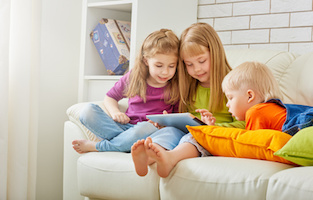
Since the beginning of time, new technology has been viewed as both a blessing and a curse. There was probably someone who, upon witnessing the invention of the wheel, muttered to themselves, “it wasn’t like this in our day.”
New technology necessitates change, which can cause disruption, be it positive or negative. Our reliance on technology is growing daily, as it is for our children. They are spending more and more time in front of smartphones, tablets and computers at home and school.
For parents, this is a challenge – how do we make sure our families get the most out of technology, without being ruled by it? Traditional recommendations for screen time limits seem impossible to adhere to as they use them at school, for homework and for entertainment (discouraging any media use under age two, and limiting older kids’ use to two hours a day), so we need to evolve along with technology and understand how children use digital tools.
Many apps and devices are marketed at children, but it is important to ascertain whether they are actually constructive f0r them. They can be fantastic teaching tools, and children should be guided to connect and create using technology, rather than simply passively consuming it.
This means making the most of staying in touch with friends and family using Skype, Facetime and other video-chat tools. It means being actively creative – using YouTube to find fun ideas on things to make and do, or by making their own movies, songs and stories.
Set expectations and house rules and make sure they are upheld. Sites like Youtube are amazing for information, but they also contain plenty of clips which are wildly unsuitable for children. Use parental controls and explain why there are boundaries for use.
Be involved with your children’s technology and its use. Many parents now occasionally use technology for babysitting purposes, but keep this as limited as possible. You should know what your kids are up to online, just as you do for the rest of the day.
Technology should not be a free for all and children still needa good portion of their day technology-free. They should have time to be bored. They need time to find their own solution to boredom (which is usually fantastic creativity, given the opportunity).
Quiet time away from the bright lights and instant gratification of the virtual world affords kids mental space. Screen time does not alleviate boredom and there is no reason for children to be stimulated and occupied for every minute of every day.
Excessive technology exposure is still closely associated with obesity, poor sleep, difficulties with social interaction and poor executive function in the brain, leading to developmental delays.
Kids need unstructured play and parents need to stay engaged – they have to see healthy digital behaviour modelled and be given non-negotiable boundaries. If kids are to grow up with a healthy concept of what digital tools are and how to use them effectively, creatively and kindly, we need to teach them.









Join the Discussion
Type out your comment here:
You must be logged in to post a comment.